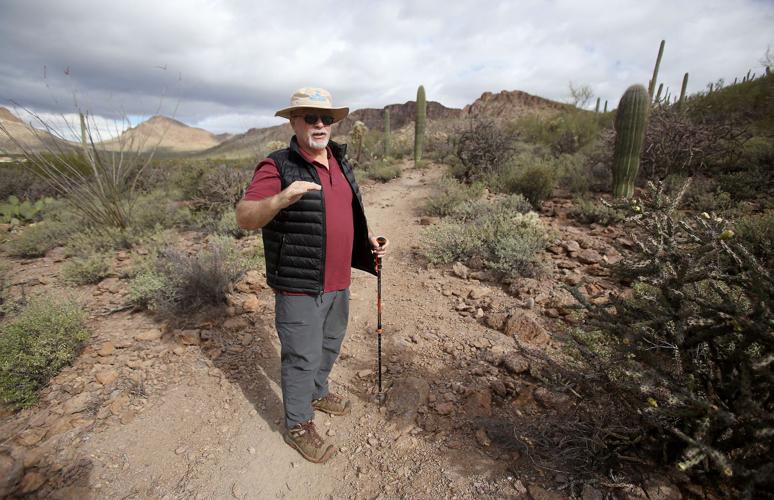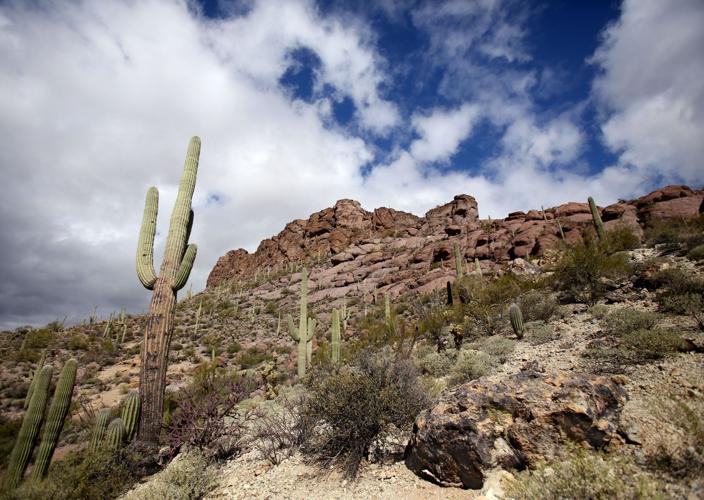Mark Flint’s passion in life is all about creating the perfect path.
A widely respected designer of trails for hikers, mountain bikers and equestrians, Flint serves as trails program coordinator for Pima County Natural Resources, Parks and Recreation.
His trail-building expertise and aesthetic vision have guided the creation of dozens of miles of user-friendly, sustainable trails in Tucson Mountain Park and elsewhere in Southern Arizona.
“Our primary directive is resource protection, and that means sustainability when it comes to trails,” Flint said as he trekked a recently completed trail segment in the Tucson Mountains.
“So the first priority is sustainability, but right after that is aesthetics,” he said. “If you give people what they want, an enjoyable experience, they’re likely to stay on the trail” and avoid trampling over fragile desert areas.
Designing a sustainable trail means creating a route that’s resistant to erosion, plant damage, shifting rocks and other factors that alter the landscape.
That challenge draws on Flint’s extensive experience with creating secure trails that fit into the landscape without impacting it excessively. He has guided construction of segments of the cross-state Arizona Trail in the Tucson area as well as county routes such as the Maeveen Behan Trail northwest of Tucson — usually recruiting and training volunteers for the work.
If creating a sustainable trail calls for technical expertise, the aesthetic factor involves an appreciation for scenic values and perhaps a degree of intuition.
“This trail,” Flint said on the Tucson Mountains trek, “surfs around right here. It has a little sinuosity.”
Farther up the way, he points out that the trail traverses a slope at about midway between a valley and a high ridge.
“This is a mid-slope-level trail,” he said. “You get so much more intimate with the rock features up here.”
TRAIL GURU
County officials have high praise for Flint’s expertise.
“The value of Mark’s work on trails has been outstanding,” said Steve Anderson, planning division manager for Pima County Natural Resources, Parks and Recreation. “He’s become the guru for sustainable trails in the West, and he’s been making a huge difference on our trails.
“For more than 12 years, Mark has been dedicated to making our routes fully sustainable, and that has had a tremendously positive impact in many of our jurisdictions,” Anderson said. “Our new trails aren’t susceptible to erosion like the trails we used to experience around the Tucson basin.”
The new sustainable trails have less initial impact on desert landscapes and far fewer maintenance requirements than old-style trails.
“And the best part is that people tell us they’re a lot of fun to use,” Anderson said.
“In addition to part of the Yetman Trail and the new Starr Pass Trail in Tucson Mountain Park, we’ve done fully sustainable trails at the Sweetwater Preserve, Tortolita Mountain Park, the Robles Pass Trails Park and the Maeveen Behan Desert Sanctuary,” Anderson added.
“And Mark has designed the trails we’re going to be putting in at the San Juan Trails Park, the McKenzie Ranch Trails Park, the Enchanted Hills Trails Park, and more,” he said. “Future trails at Tucson Mountain Park, namely the Explorer Trail and the Mockingbird Trail, will be done the sustainable way, too.”





